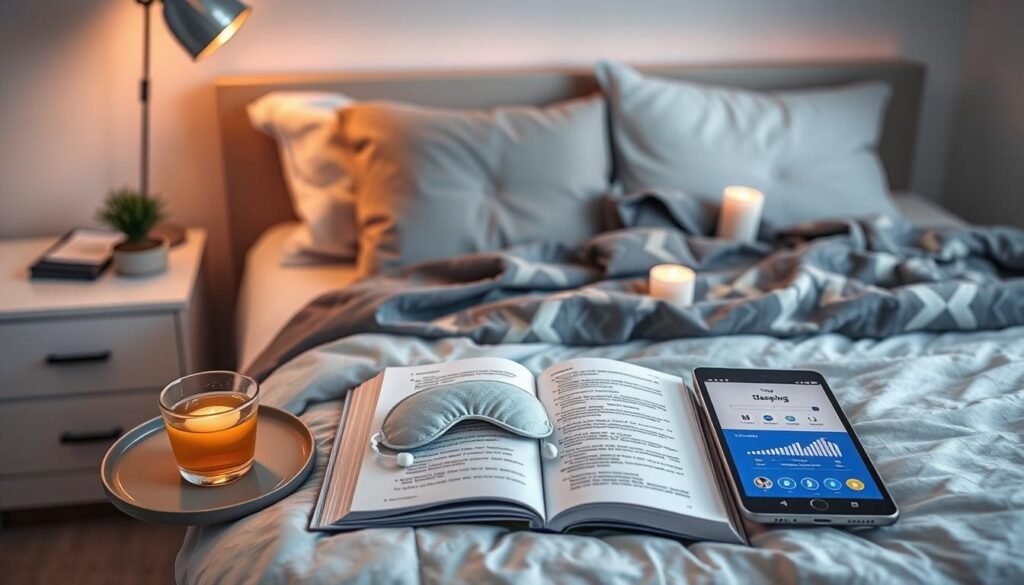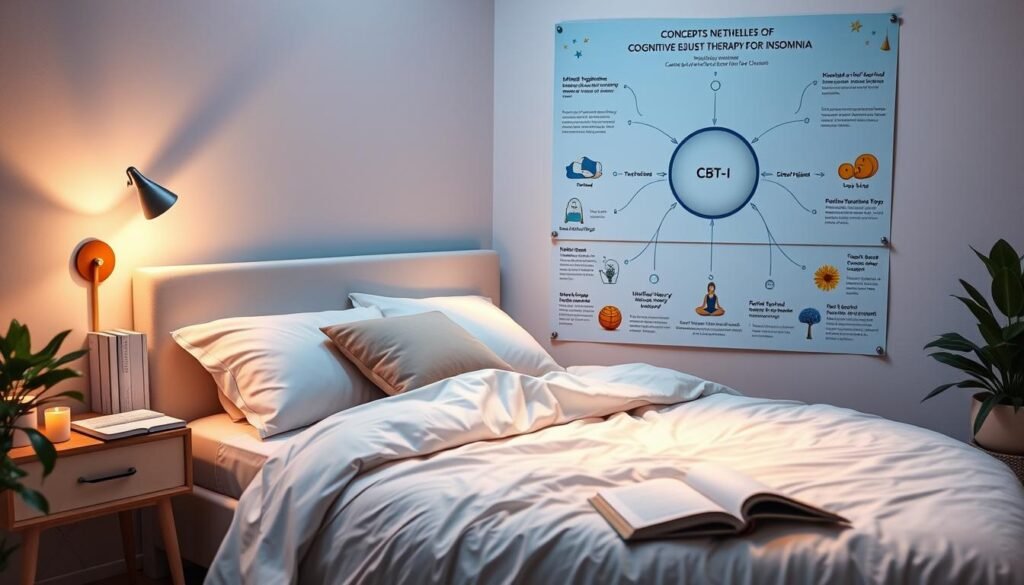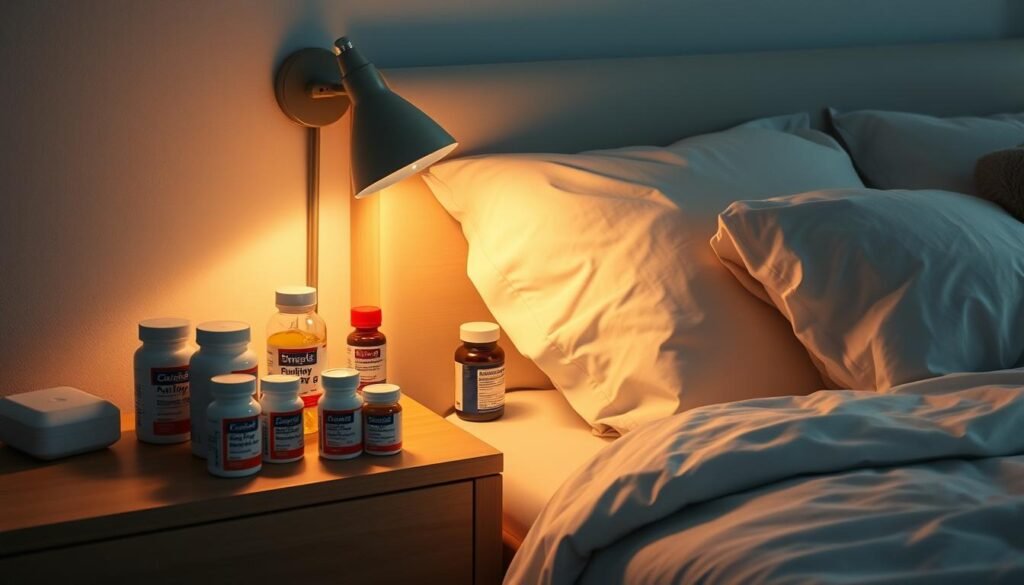Did you know that about 10% to 30% of adults in the U.S. have trouble sleeping? This important fact shows why it’s crucial to have special treatments for different kinds of insomnia. With so many people feeling tired and not doing their best, it’s key to know the specific symptoms of each type. Treatments like talking therapies or medication can really help improve sleep and how good you feel.
Key Takeaways
- Insomnia impacts 10% to 30% of U.S. adults, showing the need for specific treatment methods.
- Talking therapy for insomnia is often the first suggested solution.
- Using pills to sleep is only a short-term solution to avoid habit-forming and side effects.
- Making lifestyle adjustments, like exercising more and better bedtime habits, can make sleep better.
- Trying natural methods like melatonin or being mindful can help, but results can vary.
Understanding Insomnia: Types and Symptoms
Insomnia is a sleep disorder impacting many people. It’s split into acute and chronic types. Knowing the difference helps in finding the right treatment and bettering sleep.
Common Symptoms of Insomnia
People with insomnia may face difficulties. These include:
- Difficulty falling asleep
- Frequent awakenings during the night
- Mornings feeling unrefreshed or fatigued
- Daytime sleepiness
- Problems with concentration or memory
These issues can hurt work and personal life. Knowing these symptoms helps in seeking early help.
Differences Between Acute and Chronic Insomnia
Acute insomnia is short-lived, lasting days to weeks. It’s often caused by stress or changes in the environment. On the other hand, chronic insomnia lasts for three months or more. It might be linked to health problems, bad sleep routines, or certain medications. This long-term issue can have serious health impacts.
Studying these types helps in creating effective treatments. Chronic insomnia can arise from stress, disrupted sleep cycles, or mental health issues. Understanding the causes is key. For more on insomnia types, check this resource.
How Treatment Varies Based on Insomnia Type
Treatment must fit the specific insomnia symptoms and patterns of the person. Acute insomnia comes from temporary stress. It can improve with short-term treatments like changing lifestyle and relaxing more. Chronic insomnia needs a detailed plan because it lasts longer and is more complex.
Tailoring Approaches Based on Symptoms
It’s critical to know why someone can’t sleep to help them. Cognitive Behavioral Therapy for Insomnia (CBT-i) is often the best long-term help. It focuses on symptoms and behaviors that stop sleep. This insomnia management works well for most sleep problems, no matter the cause.
Short-term vs. Long-term Treatment Plans
There’s a big difference between short-term treatment and long-term treatment of insomnia. When stress causes short-term insomnia, simple fixes might work. Things like better sleep habits and a peaceful bedtime routine can help. For long-standing insomnia, using CBT-i along with medication might be needed.
Learning how to relax and changing the sleeping area can also make a big difference. Knowing if the solution should be quick or long-lasting helps shape the best plan for healthy sleep.

Non-Pharmacological Treatments for Insomnia
Insomnia can greatly affect daily life. Many are looking for ways to fix it without drugs. Non-drug options are proving helpful, especially for chronic insomnia. These methods focus on the main causes of sleep problems. They also help improve sleep quality.
Cognitive Behavioral Therapy for Insomnia (CBT-i)
CBT-i is a top treatment for insomnia. It involves four to eight sessions. The program uses different strategies to help fix sleep patterns. It teaches how to change negative thoughts and actions that cause insomnia. Tools like sleep restriction and stimulus control are used. Many people see a big improvement in their sleep with this therapy.
Importance of Sleep Hygiene Practices
Good sleep hygiene is key to sleeping better. This means having a regular sleep schedule and a comfy sleep space. It’s also important to avoid things like caffeine before bed. Reducing screen time and doing calming activities help too. These steps can make a big difference in fighting insomnia.
Relaxation Techniques to Aid Sleep
Using relaxation techniques helps the body and mind get ready for sleep. Things like deep breathing, meditation, and muscle relaxation lower stress. They make it easier to fall asleep. Adding these practices to your routine can boost sleep quality and overall health. They show how non-drug treatments can be really effective for insomnia.

Medication Management for Insomnia
Many people with insomnia need medication when other methods don’t work. There are various sleep aids for different conditions. It’s important to know how and when to use these drugs for sleep troubles.
Types of Prescription Sleep Aids
Prescription sleep aids come in different types for different needs:
- Benzodiazepines: Drugs like triazolam and temazepam help you fall asleep. Yet, they might lead to dependency and withdrawal.
- Non-benzodiazepine (Z drugs): Zolpidem and eszopiclone are options with fewer risks. They help reduce the time to fall asleep.
- Melatonin agonists: Ramelteon helps regulate sleep cycles safely.
- Low-dose doxepin: It’s effective for keeping you asleep, offering another option.
Short-term vs. Long-term Medication Use
Using sleep meds should be watched closely. Short-term use is for quick relief. This allows for other therapies to work over time. But using them too long can lead to problems like dependency.
For ongoing insomnia issues, combining meds with therapy is best, according to experts. About 4% of U.S. adults take sleep meds in a month. Knowing when to start meds is key to staying safe and getting good results.

Lifestyle Changes for Better Sleep Health
Making small changes in your way of life can greatly improve sleep. Adopting daily routines can help you sleep better at night. These habits fight insomnia and create a peaceful sleep space.
Daily Routines to Enhance Sleep
Having a structured daily routine is key for good sleep. Here are ways to boost your sleep quality:
- Create and stick to a regular sleep schedule.
- Limit naps during the day to keep night sleep steady.
- Avoid caffeine in the afternoon and evening for easier sleep.
- Eat light meals before bed for a calm digestive system.
- Make a calming bedtime routine to wind down before sleep.
Following these routines sets up a good environment for sleeping. Using such strategies is often a first step in treating insomnia. A study shows educational sleep habits help those with insomnia.
The Role of Exercise in Sleep Quality
Regular exercise is key for better sleep. Working out reduces stress and lifts your mood, aiding in sleep. Why exercise matters:
- Doing any exercise helps you fall asleep easier.
- Exercise in the morning or afternoon to avoid being too excited at bedtime.
- Simple actions like walking or stretching can improve night relaxation.
Choose workouts that you enjoy to stay consistent. Knowing that exercise supports your body clock can enhance your sleep. To better sleep health, consider these lifestyle tweaks.
Alternative Treatments: Do They Work?
Many people look for other ways to treat insomnia aside from regular medications. They try different methods, like herbal remedies and acupuncture. These approaches may help, but their success and safety vary. Knowing about these choices helps people make good decisions about their sleep therapy.
Herbal Remedies and Supplements
Herbal treatments for sleeplessness are becoming more popular. Valerian root, for example, could help some people sleep better. But, it’s important to use it carefully because it can interact with other medicines and have side effects. Other natural sleep aids include:
- Chamomile: The FDA says it’s usually safe and poses little risk, unless you’re allergic to certain plants.
- Ashwagandha: Taking 300 milligrams of Ashwagandha leaf extract twice daily may help improve sleep.
- Kava: Kava can help with sleep issues caused by stress, but it might affect liver health.
- Melatonin: This hormone has varying success in adjusting sleep cycles, but many people use it for better sleep.
Acupuncture and Other Therapies
Acupuncture tries to balance the body and might improve sleep for some insomnia sufferers. Though promising, more studies are needed. Other helpful practices include:
- Relaxation and Meditation: These methods have been shown to work well against insomnia, supported by many studies.
- Exercise: Staying active improves sleep for people of all ages. Especially effective are gentle activities like tai chi and yoga.
- CBD and Cannabis: Some say it helps them fall asleep faster. Still, more research is necessary to understand its full effects and safety.
- Sleep Hypnosis: Clinical studies have found sleep hypnosis useful in changing sleep-related thought patterns, helping with insomnia.
| Treatment | Effectiveness | Safety |
|---|---|---|
| Valerian Root | Some evidence supports benefits | Possible medication interference |
| Chamomile | Safe for most users | No known side effects |
| Ashwagandha | Improves sleep quality | Generally regarded as safe |
| Kava | Improvement in stress-induced insomnia | Potential liver concerns |
| Melatonin | Mixed effectiveness | Generally safe when used appropriately |
| Acupuncture | Promising but needs more research | Low risk when performed by professionals |
Understanding Circadian Rhythm Disorders
Circadian rhythm disorders mess with sleep and daily life. Conditions like Delayed Sleep-Wake Phase Disorder (DSPD) and Advanced Sleep-Wake Phase Disorder (ASPD) throw off the natural sleep cycle. DSPD, for example, affects a small part of the overall population.
However, it’s much more common in teenagers, affecting between 7% and 16% of them. People with these disorders struggle to wake up early. This hurts their sleep quality overall.
The Impact on Sleep Patterns
It’s key to get how these disorders change sleep. People with DSPD can sleep well if they follow their body’s preferred schedule. But they have a hard time making up for lost sleep. Genes might make some more likely to get these disorders, especially with light sensitivity.
Making lifestyle tweaks, like better sleep habits and changing light exposure, can help ease symptoms.
Managing Disorders Through Light Therapy
Light therapy is a big help in managing these sleep disorders. It involves using bright light in the morning to help set the sleep-wake rhythm. For DSPD sufferers, morning light is especially helpful in syncing their internal clock with outside time.
Melatonin might also help fix sleep schedules, but you should be careful since it’s regulated differently. Learning about these treatments can improve sleep for those dealing with these disorders. For more on treatment and management, check out this resource.
When to Seek Professional Help
Knowing when to seek help for insomnia is key to proper treatment. Many face sleep issues at some stage, but persistent problems may need expert care. If sleep troubles last and upset daily life, seeing a healthcare provider is wise.
Indicators of Serious Sleep Disorders
Several signs point to insomnia being a serious issue. Look out for these indicators:
- Persistent difficulty falling or staying asleep for more than one month
- Big daytime fatigue, irritability, or trouble thinking
- Waking up a lot at night or too early in the morning
- Signs of other disorders, like sleep apnea or restless legs syndrome
- Using sleep medications more and more
About 40 million Americans deal with insomnia yearly, with some needing professional help. Chronic insomnia happens at least three nights a week for three months or more. It often needs detailed checking.
Diagnostic Processes for Insomnia
To diagnose insomnia properly, it all starts with a full medical check-up. This process includes:
- Keeping a detailed health and sleep diary
- Filling out questionnaires about sleep troubles
- A physical check-up to find other health issues
- Sleep studies to watch sleep habits, if needed
There aren’t many sleep medicine therapists in the U.S., so getting diagnosed and treated early is crucial. Treatments that change behaviors can last 6 to 8 weeks and often work well. Cognitive Behavioral Therapy (CBT) helps over 70% of people with insomnia, better than medication for many.
Conclusion
Insomnia is a big issue, touching about 10% to 15% of adults in the US. Finding the right treatment is key because everyone’s experience with insomnia is different. Plans should mix methods, like medicine and therapy, to help people sleep better and feel good again.
CBT-I is often the first choice for treatment. But there are also medicines that can help. It’s important to know the risks of these medicines, though. The best treatment depends on the person’s specific needs. This includes thinking about how common chronic insomnia is and its symptoms that people often miss.
Lifestyle changes are also a big part of preventing insomnia. Keeping a regular sleep schedule, handling stress well, and having good sleep habits can make a big difference. As more people pay attention to sleep health, knowing more and finding the best treatments are important for dealing with this widespread issue.